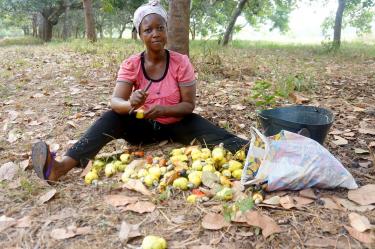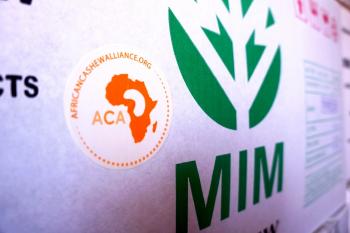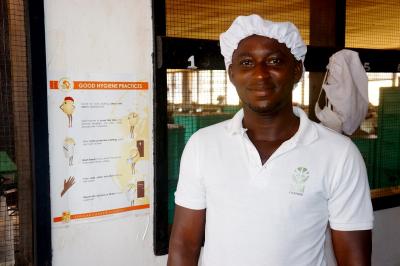Safe, Sustainable, and Socially Responsible - Mim Cashew, a Seal Success Story
Pick, pull, plop. Pick, pull, plop. This is the sound of cashew nuts being plucked from fallen apples scattering the ground of Mim Cashew. Margaret and Fusenia sit in the dappled shade under one of thousands of cashew trees on the farm, beginning the process that will eventually result in ACA Seal-certified cashew reaching international marketplaces.
 Producing export-ready cashew is a lengthy and labor-intensive process, but companies like Mim Cashew are working to streamline and make the most of that process. Located in the Brong Ahafo region of Ghana, Mim Cashew was the second facility to receive ACA Seal approval, in December 2012. In addition to processing cashew kernels that adhere to international food safety and quality standards, Mim also grows organic nuts, and distills brandy from the cashew apples that would otherwise be discarded. This kind of sustainable sensibility is gradually permeating Africa, and the ACA Seal presents cashew processors with an opportunity to be a part of the movement.
Producing export-ready cashew is a lengthy and labor-intensive process, but companies like Mim Cashew are working to streamline and make the most of that process. Located in the Brong Ahafo region of Ghana, Mim Cashew was the second facility to receive ACA Seal approval, in December 2012. In addition to processing cashew kernels that adhere to international food safety and quality standards, Mim also grows organic nuts, and distills brandy from the cashew apples that would otherwise be discarded. This kind of sustainable sensibility is gradually permeating Africa, and the ACA Seal presents cashew processors with an opportunity to be a part of the movement.
Growing demand and income
Though many cashew processors purchase all of the raw cashew nut (RCN) that they need, Mim runs a growing farm in addition to its factory. Farmworkers are therefore even more directly impacted by prices for cashew kernel.
“When the price on the world market goes up, we try to reflect that in our per kilo payment and adjust,” said farm manager Adusei Asante, explaining how farmworkers’ incomes are affected by changing kernel prices.
Demand for Seal-certified cashew has already directed business to Mim, which recently received interest from buyers looking for quality kernels. “We were so happy because we didn’t tell the buyer that we had the ACA Seal, he already had the information,” said Anilkumar Pillar, a Factory Manager who oversaw much of the Seal implementation process. “That is the benefit of the ACA Seal.”
More demand for cashew, combined with buyer demand for product that is Seal-certified, is increasing sales for Mim, a benefit that is now being felt by farmers. “They have increased the price per kilo since last year,” noted Matthew, a farm overseer. “As time goes by, the pay grows.”
Expanding opportunities for women
At Mim, like nearly all cashew farms and factories, production is accomplished almost entirely by women.
“People are glad we have Mim here, because the company employs 90% women,” said Mr. Asante. “Those who are interested have the opportunity to work, instead of staying in the house.”

Women’s voices across the farm echoed Mr. Asante’s sentiment. Fusenia, who has been working as a picker in the fields for three years, said, “If I wasn’t working at Mim, I would just be at home, not doing anything. Because of the work I can get money to buy some things for myself.”
For some, working at Mim is the first step towards achieving financial independence that will enable them to pursue long-term career goals.
“I learned a trade and wanted money to begin a business,” shared Mathilda, another picker with three years of experience. “This job is helping me financially, so I can start a savings account at the bank and eventually open a shop.”
As a major provider of jobs in the region, Mim Cashew has gained respect among the local population. The Mim Cashew company was founded in the late 1960s, and like the owners before him, Lars Wallevik, Managing Director and owner of Mim, is committed to investing not only in cashew but also in the community.
“I really want to make the area a nicer place to come to,” said Mr. Wallevik. “'Mim Cashew is engaged with the local community in various current projects, such as some traditional home and palace restoration and a planned Technical school, amongst other social projects.”
In Mr. Asante’s words, “To the community, Mim Cashew is more or less like a friend to us.”
Creating delicious, quality cashews

Already growing certified organic cashew nuts, becoming approved by the ACA Seal was a logical next step for a company committed to producing the best quality products.
After 6 months of Seal program implementation, dedication to food safety and quality is evident throughout the factory, where workers are quick to share their knowledge on Seal standards.
“My main concern is the quality – we want to go further and continue to improve our standards,” said Twum Ebenezer, a manual peeler who has been working at Mim since October 2011. “The Seal is the way I do things, and with it I can guide and train other workers.”

“The factory workers were very happy because they know what we have been doing here,” remarked Mr. Pillai. “When we got approved, one of the workers said, ‘Finally, we got the seal!’.”
The Seal has meaning at all levels of the value chain – sustainability for consumers, quality for buyers, recognition for processors, pride for factory workers, and stability for farmers. When Mr. Pillai said “We were rewarded for the process,” he may have been referring only to his Mim factory team, but the ACA Seal offers returns for all cashew stakeholders.
Sustaining the World with Cashew
Processing in Africa can reduce the carbon footprint of the cashew value chain by up to 700% due to a more direct route to the market that reduces transportation and fuel inefficiencies – both for the economy and for the environment. ACA Seal approved cashew is guaranteed to be less environmentally costly than nuts processed in India or Vietnam.

Mim maximizes the cashew bounty not only by selling safe, delicious, and socially responsible nuts under the ACA Seal, but also by taking advantage of the diverse cashew by-products. The processing facility uses cashew shells as fuel for steam-powered machines, and the cashew apples are made into cashew brandy at the Mim distillery.
The ACA Seal gives African cashew processors a chance to be more competitive in the global market. In the long term, however, the effects of the Seal could be even more far reaching.
“We are sustaining the world,” as Mim’s farm manager Mr. Asante said. This view is optimistic, but not unrealistic - African cashew provides income for 10 million people, has the potential to reforest lands damaged by climate change, and gives consumers a safe and socially responsible snack. The ACA Seal will help ensure this promising future for African cashew .
- Connectez-vous ou inscrivez-vous pour publier un commentaire


